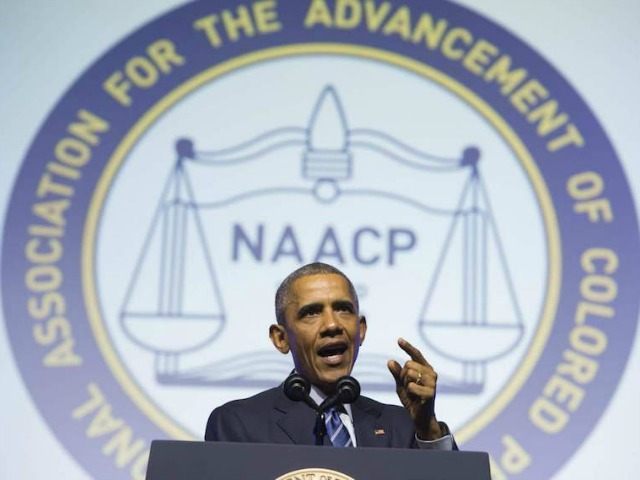Martin Luther King, Jr. Day is a good time to assess where we are in relation to Dr. King’s dream. Have we achieved it? Are we closer? Might we be further away? In an interview with The Right Voice, Breitbart News’ Jerome Hudson weighed in on King’s dream and race in America under the leadership of President Barack Obama.
Hudson, whose expertise resides, in part, in the area of race relations, is no stranger to exposing the left’s agenda to use race to divide and deceive. His role in the trenches, he believes, is “to shout down the blare of false narratives about racial politics in America.”
According to Hudson, we are in much better shape than we were during King’s involvement in the Civil Rights era. “We have not reached the mountaintop, but for all intents and purposes, we certainly are closer,” he stated, adding, “We’ve come a long way as viewing one another, whether we look different or not, as equal, as [Thomas] Jefferson would want us to.”
Hudson, however, spoke of concerns within the black community, calling out factions such as the Black Lives Matter movement, which he said is “absolutely toxic.” He was also quick to point out that some who masquerade as leadership within the black community do not actually want overwhelming progress, as it would destroy their platform. Black Lives Matter and people like Al Sharpton, he said, know that their “legitimacy is tied to racial animus throughout the American electorate.” He added, “They don’t exist if there is harmony.” While acknowledging that there are valid concerns that need to be addressed, he stressed that any meaningful conversation about race cannot “be led by people who only live to divide.”
It is Hudson’s position that the genesis of President Obama’s presidency brought a shift in the country’s racial climate; less people believe racial harmony exists, he stated, and added that this speaks of a lack of leadership on the President’s part. Asked if it was fair to place the burden of quelling racial tension on Obama simply because of his race, he said it was not fair to expect him to fix everything, but he maintained that true leaders effect change. Using Breitbart News as an example, he said, “We’d be nowhere without the vision of Andrew Breitbart, first of all.” Likewise, Obama needs to step it up. According to Hudson, he could start in his own hometown of Chicago, the ills of which he avoids calling out because doing so is not politically advantageous.
Dr. King was made of different stock than we see today, suggested Hudson. Black Americans are less likely to take personal responsibility for their condition, pointing to racism, instead. Though he realized some will accuse him of “blaming the victim,” he, nonetheless, highlighted the breakdown of the black family as the culprit for much of the ills plaguing them: “We have a fatherless problem.”
Conversely, during Dr. King’s time, about 70-80% of black families consisted of two-parent households, he said. “You did not see the number of, particularly, young black men committing the amount of crimes that you see today,” he said of King’s tenure in leadership. “When Martin Luther King was alive, you did not see as many black people dependent on as many welfare programs as they are today,” he added.
To arrive at the place Dr. King envisioned, people have to be willing to have an honest conversation–which, as a culture, he said, black people typically are not willing to do. “We have a problem airing our own dirty laundry.”
Hudson stated:
The new civil rights elite machine, this progressive movement … is not about getting at the root causes of the things that ill a lot of black people–not all black Americans–but there are far too many black Americans who would rather peg racism … or a prejudiced justice system as the end-all-be-all of the root causes that are our problems.
Speaking again of President Obama, Hudson complimented him, then again placed responsibility on his shoulders. “The President of the United States, a very educated man, has accomplished some things in his life, has an amazing family … smart guy.” One would think, therefore, that he would point out that racism is not what is making people commit the crimes they are, that people are not just a product of their environment. Look back to Dr. King’s time, Hudson said, and we will see that many blacks were “destitute,” “in poverty,” and in “squalor,” yet we did not see the drugs and violent crime we see today. Reiterating the need for strong families, he said that they were also marrying and staying with their families. Blaming black crime on environment, as Obama and others in his camp are wont to do, demonstrates a “very low standard that you have for those black people in those rough neighborhoods,” he said.
He contrasted that mindset to the mindset espoused by Dr. King, whom, he declared, “idolized Ghandi and non-violence,” unlike Black Lives Matter and other similar movements, which chant about violence against police officers “and create an environment that is so vitriolic that someone who is on edge and doesn’t have it all there, they go and commit the violent act.”
Just moments before President Obama’s final State of the Union address, Hudson advised:
The President should say from his State of the Union speech that it is past time … for us to get serious about solving some of our own problems, but I fear that he won’t do that, and that’s really sad because Dr. Martin Luther King would want us to recognize the progress that we’ve made, but he would also want us to continue marching on.
And as we reflect on the state of the black community while once again celebrating his uniquely American holiday–Dr. King’s admonition would be, “Let us examine ourselves,” Hudson said.
Listen to the full interview below:

COMMENTS
Please let us know if you're having issues with commenting.